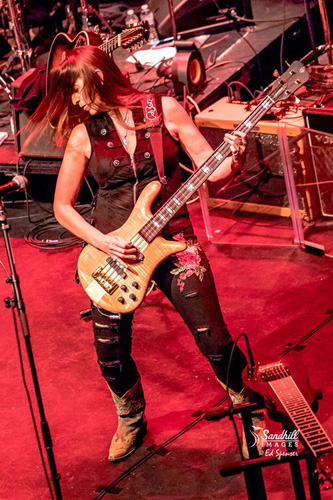I had the pleasure to speak bassist Autumn Martini, one of the newest members of the Florida-based tribute band In The Light Of Led Zeppelin. When the band was looking for a new bassist they brought in Martini, and in doing so, they opened the flood gates for the introduction of two other members into the fold — violinist Randi Fishenfeld and keyboardist and mandolin player Linda Kiley.
Autumn and In The Light Of Led Zeppelin not only tackle the most ambitious Zeppelin tracks; with the addition of the mandolins and violins, the six-piece also play Jimmy Page and Robert Plant’s arrangements from their 1994 “No Quarter” project that reinvented Zeppelin’s classic tunes. A Grammy-nominated player of panache as well as invention, Martini sheds light on what it means to be in one of the top Led Zeppelin tribute bands in the world.
~
So, the idea of covering the Page/Plant orchestral renditions never occurred to you until you went forth to gather the new members?
It was always in the founding members’ mind, coming out of a nine-year year stint as a Led Zeppelin tribute (four guys playing album and live concert cuts while looking the part). We wanted a challenge, a way to stay creative, and the best teachers were Jimmy Page and Robert Plant themselves. Once we found all the right members, everything fell into place.
I was noticing how drummer Keith Howard is especially precise in his playing but not thunderous in the way John Bonham was. Can you explain his approach?
His approach is simple — he plays like Keith Howard (laughs). Actually his style is more like Michael Lee, who played on the Page and Plant tours. Michael Lee’s approach was very energetic and precise verses thunderous and precise.

Can you explain how you skirt the fine line between faithful recreations of such well-known tunes and investing the performances with your own spin, beyond just adding a violin in the background to a tune or two?
When we orchestrate we are very careful not to take away from sacred parts of the song. Keeping true to certain notes and feel. If you look at 1994 No Quarter when Jimmy Page and Robert Plant recreated “When The Levee Breaks,” they clearly modified this rule. We, in turn, stay close to the original magic of the composition. In “Ramble On,” we added drum fills, the bass is not staccato, and the violin adds a subtle note on top, but the song doesn’t take you too far from the “Ramble On” you know because our guitarist recorded the guitars in the exact way that Jimmy Page did on the original. In Page and Plant’s version of “Kashmir,” they started the song with just vocals. It was beautiful rendition that only Jimmy Page and Robert Plant could do. In being true to our creativity, we felt it vital for us to start the song with its original powerful beginning, the one that everyone recognizes by those first few notes. So in our version, it’s a nice mix of both Page and Plant’s spectacular re-arrangement and the original.
Is working with vintage equipment as challenging as learning the 100 or so songs you have ready all the time?
Both are a challenge. The equipment is constantly being evaluated and reviewed against what the band originally used. Over the years we have built up quite the arsenal. Depending on the venue, our guitarist alone travels with twelve to fourteen guitars, including electric and acoustic double-neck guitars. As far as the songs it’s not too terrible. We are covering Led Zeppelin, Page and Plant, Coverdale and Page, and Robert Plant in our live shows. It’s a lot of choices. We like to switch it up so no two shows are ever alike. Keeps us creatively busy.
Is there any Led Zeppelin tune you were especially scared of but it came out better than you imagined? Or any others you thought would be a breeze and ended up being such a tough nut to crack you can’t play it?
“The Song Remains the Same” was the one that scared me. So much going on, but after studying the recorded versions and the live versions, it was a breeze. When you study someone’s playing, it becomes easier over time. You recognize signature patterns that they commonly use, so naturally what was the tough nut to crack was when we started playing Page and Coverdale and Robert Plant material. Now we are going beyond the artist we knew. The structure and timing in Coverdale and Page’s “Shake My Tree” was a huge challenge as well as was “Big Log” by Robert Plant. It’s just a whole other kind of style. I got to give that man huge writing credit. His music is far more complex than I think people realize.





















